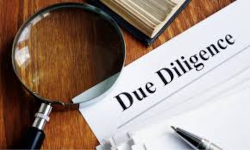Due Diligence SERVICES

Investigation and Reports
Due diligence is the steps an organization should take to thoroughly investigate and verify an entity before initiating a business arrangement, whether that's with a vendor, a third party or a client.
In the general business sense, due diligence means vetting issues that affect the business thoughtfully and carefully.
Unfortunately, there are many entities offering business deals, loans, products and services that are either not what they are painted to be, or worst case, downright scams.
We are here to help you navigate these offers and ensure that you are not misled by false documentation or bogus companies, and pay for something that is not delivered.
There are several types of Due Diligence, including, but not limited to:
In the general business sense, due diligence means vetting issues that affect the business thoughtfully and carefully.
Unfortunately, there are many entities offering business deals, loans, products and services that are either not what they are painted to be, or worst case, downright scams.
We are here to help you navigate these offers and ensure that you are not misled by false documentation or bogus companies, and pay for something that is not delivered.
There are several types of Due Diligence, including, but not limited to:
- Vendor due diligence: Investigating the potential risk of new vendors
-
- Technology due diligence: Auditing IT infrastructure for any potential risks. This is also a common part of M&A due diligence.
- Financial due diligence: Analysing an organization’s financial performance before completing a merger or acquisition.
- Regulatory due diligence: Reviewing an organization’s policies, processes and procedures to verify whether they’re compliant with all relevant regulations
- ESG due diligence: ESG due diligence determines the impact an organization may have on environmental, social and governance issues and actively takes steps to mitigate that impact.
©2021 - ALL RIGHTS RESERVED - BHW CONSULT LTD


